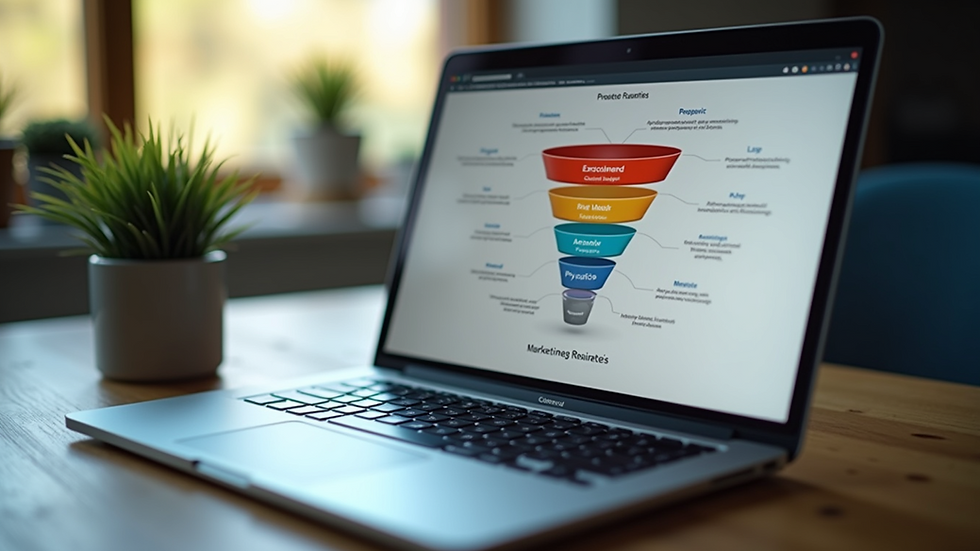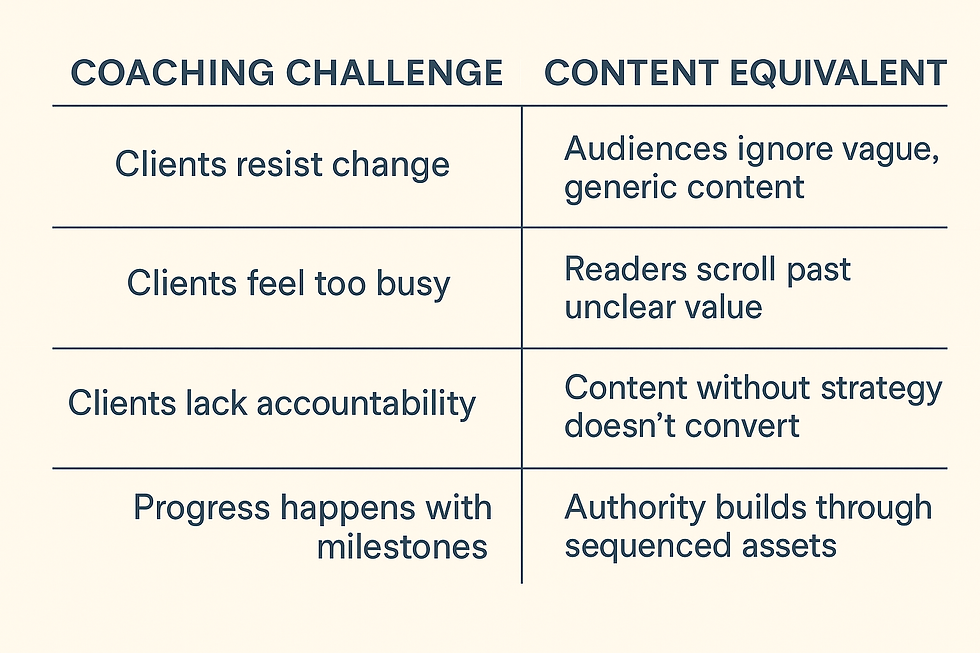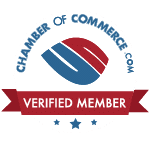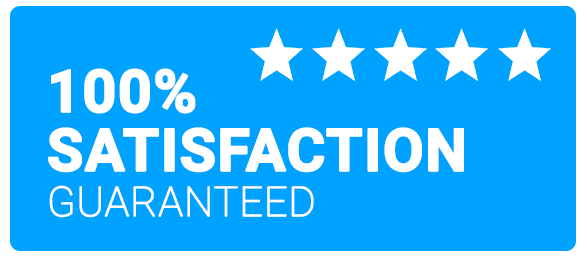B2B Content Strategy: Authority over Attention
- Christine Alexy

- Aug 6, 2025
- 6 min read

B2B Content Strategy. Authority That Builds Trust—and Business Growth
You’ve already heard the surface-level advice: post consistently, use CTAs, and share your story. Fold that fluff.
If you’re serious about commanding executive attention, you need more than visibility—you need equity.
Lights on: attention is rented. Authority is owned.
And that’s the difference between getting liked and getting booked.
Today’s blog breaks down how executive coaches, consultants, and entrepreneurs can create content that performs—building trust and business growth through high-authority content.
Missed the last post on GEO (Generative Engine Optimization) and how it’s changing content marketing and visibility forever? Read it here.
How Do Executive Coaches Build Credibility?
Client Snapshot: From “Best-Kept Secret” to $25K Keynote with One Strategic Trustpoint™
A while back, an executive leadership coach (we’ll call him Michael) said something that stuck with me:
“I’ve been doing this work for years—refining my frameworks, serving clients, and building my name through referrals. But I’m tired of being the best-kept secret in the room.”
He wasn’t just starting out. He had real credibility. In every 1:1 conversation, people leaned in. But online? He sounded like every other coach trying to stand out—and none of it was landing.
So we started small. I ghostwrote an article for a niche trade publication. Next, a targeted pitch to Forbes.
That piece landed with a deep impression. Michael leveraged the high-referral backlink across his website, media kit, and subsequent posts—something he had previously lacked. Reposts started. So did the DMs from people who’d been watching but never liked or commented.
A few weeks later, he landed his first $25K keynote from an executive who’d been following him silently for months. By pairing the as-seen-in Forbes feature with the brand equity of the corporation he’d just presented for, he amplified his credibility across every client-facing touchpoint—embedding Trustpoints™ into LinkedIn posts, his website, and proposals. That strategy ultimately secured his first leadership workshop contract with another major organization.
We’ve seen this B2B content strategy work with every client who prioritizes authority over vanity metrics.

How Do Consultants Build Authority Online?
If you’re only pushing social posts, you’re really not planning content—you’re improvising visibility. In the best-case scenario, your best ideas are getting buried.
Social platforms keep you visible. But it’s your strategic assets that make you credible.
Instead of showing up with picosecond posts, build a body of content assets:
Thought leadership articles that trigger shares, invites, and DMs [from qualified leads]
Gated white papers that are downloaded, cited, and bookmarked
Authority reports that grow your list and qualify your leads
Books that get ghostwritten, pitched, and published
Yours truly builds these authority assets. They compound over time, generate quality inbound leads, and establish intellectual property you can use across your funnel. And they outperform social posts by 2x to 3x, as cited by the Content Marketing Institute’s 2024 benchmark report (CMI Report).
Why Do Authority Assets Outperform Flash Content?
Your prospects are oversaturated and underimpressed.
Every day, they scroll through recycled tactics. So when they come across substance—research-backed, well-framed, professionally structured content—it’s a psychological shift.
You’re no longer just visible. You’re valuable. Your ideas feel like certainty against the bewildering clamor.
Right there, that’s the function of Authority content:

It triggers authority bias
It activates recall and trust
It signals long-term value and positioning
Even AI knows the difference. Google’s 2024 Helpful Content Update and platforms like ChatGPT and Perplexity now favor well-structured, sourced content over keyword fluff (Google Update).
I cannot stress this enough. If you want to show up in the answers your ideal clients ask, feed the engine what it trusts: expert-authored white papers, bylined magazine features, and original frameworks.
Think of Content Like a Coaching Engagement—Not a Coaching Session
As a leadership coach, you know breakthroughs don’t happen in a one-off. Authority takes structure, consistency, and reinforcement.
Here’s how your coaching challenges mirror the content challenges your audience faces every day—and why your approach to transformation is precisely what your content strategy needs:

In sum, just like your clients need structured guidance to grow, your audience needs clear, sequenced content to convert.
If only it were as simple as showing up with a checklist. But you know better. You:
Set expectations
Guide reflection
Reinforce insights
Build trust through time and structure
Content strategy works the same way:
A thought leadership article opens the conversation
A featured article adds social proof
A gated authority report qualifies the lead
A white paper delivers clarity and depth
A LinkedIn repost reinforces your brand
A DM or CTA closes the loop
Together, these create a cadence of credibility.
Why Visibility Alone Isn’t Enough
Not all visibility is created equal.
LinkedIn, Instagram, and other platforms should serve as touchpoints—quick-access moments that maintain presence. But to anchor trust, you need Trustpoints™: credibility-rich platforms that endorse and validate your expertise with real-world impact.
Professionally published thought leadership creates measurable business outcomes. These Trustpoints™ establish authority and transfer credibility across your entire content ecosystem. For example:
A bylined magazine feature
signals editorial approval and industry relevance
A syndicated press release
increases reach and positions you as newsworthy
A published book with a reputable publisher
cements your intellectual property and deepens perceived expertise
A white paper cited by other experts
amplifies your authority and boosts SEO trust
High-authority Trustpoints™ don’t merely build standalone credibility—they amplify everything you embed them into. From your LinkedIn reposts to your homepage, your entire funnel becomes more believable.
To activate the Rule of 7, you need elevation, not echo.
You already coach this every day. You just haven’t content-mapped it—yet.
According to a study by Edelman and LinkedIn, 75% of decision-makers said that encountering strong thought leadership content prompted them to research new providers—and 70% reconsidered their current vendor after consuming such material.
Alexy Leadprint. That’s how credibility compounds—when it’s published through high-authority platforms and distributed with precision. That’s your Trustpoints™ in motion.
As Rhea Wessel and Michael Hoeppner explain in Investor’s Business Daily, thought leadership succeeds when it connects expertise to real-world challenges in a way that builds trust and prompts action.
SEO data confirms it: endorsements from reputable platforms don’t just boost rankings—they transfer credibility.
And behavioral neuroscience backs it up. Authority bias prompts people to automatically trust experts. Endorsements, bylines, and citations create mental shortcuts that reduce skepticism and accelerate commitment.
The Rule of 7 Isn’t Dead—You’re Just Using It Wrong
You’ve heard it: prospects need to see your message at least seven times.
But spamming doesn’t build trust. Sequencing does.
Here’s how to activate the Rule of 7 using a modern authority stack:
Blog post → share a problem and solution
Forbes feature → build social proof
Gated authority report → qualify the lead
White paper → deliver clarity & depth
Email series → nurture & educate
LinkedIn repost → retarget & reinforce
DM → convert with a booking link
Each format builds on the next. Each one reinforces your expertise. And each one earns you the trust social posts never will.
Position Yourself as the Source—Not a Commentator
Here’s how we ghostwrite authority assets that perform:
1. We anchor every idea to business relevance.
Your DEI insights tie to revenue. Your leadership philosophy maps to enterprise agility. Your origin story aligns with your client’s current pain point.
2. We use GEO-focused phrasing.
You’re not just a consultant—you’re a “culture transformation strategist.” You don’t just teach leaders—you offer “decision-making frameworks for high-stakes environments.”
3. We engineer editorial trust.
Your articles are structured to meet editorial standards, align with EEAT, and attract high-authority backlinks.
4. We pitch and land features.
From Inc. to HBR digital magazines, we ghostwrite articles, query letters, and pitches that editors and gatekeepers accept. (You get the byline and results! We get referrals!)
Expert Tip: 3 Backlinking Strategies That Build Authority
Qwoted & Featured: Provide expert quotes to earn backlinks and media placements
Gated Authority Reports: Create original research that others want to cite
Syndicated Guest Features: Republish features on Medium, LinkedIn, and industry blogs
These build both SEO strength and audience trust.
Does Content Build Trust? How does Authority Convert Trust?
Anyone can create content. One hundred sixty-two million Americans consider themselves content creators.
But you know the difference, and many fail to establish authority.
That’s why your strategy should focus on:
Content types that rank higher with AI (white papers, magazine features)
Platforms that carry trust (editorial, not self-published)
Language your audience already types into search
Ideas built around what you know—not just what you sell
You already know strategy beats hustle.
Now your content should reflect it.
How Do You Start Generating Leads, Deals, and Citations?
Alexy Leadprint. That’s what we do!
At Alexy Pro Writing, we ghostwrite white papers, query letters, feature articles, and full manuscripts—then pitch them to high-authority publications. Our clients get featured, get ranked, and get booked.
AI is exploding—time to EXPLODE your content marketing.
We call it: B2B‑ScaleAuthority™.
Let’s make your expertise harder to ignore—and impossible to copy.
> If you found this post helpful, give it a like and share it with your network. And let me know in the comments: what’s the biggest struggle in your niche when it comes to content?







Comments